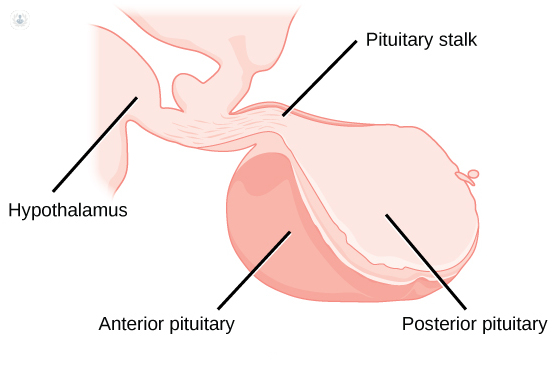Diseases of the pituitary and hypothalamus
Professor Gordana Prelevic - Endocrinology, diabetes & metabolism
Created on: 01-27-2014
Updated on: 05-17-2023
Edited by: Karolyn Judge
There are a number of diseases which can affect the pituitary and hypothalamus. The hypothalamus is part of the brain and the pituitary gland is situated just underneath. Both are responsible for the production and regulation of various hormones. When either of these glands are affected, a range of conditions can occur.

What are the causes of diseases of the pituitary and hypothalamus?
The most common cause of a problem with the pituitary and hypothalamus is the growth of a benign tumour known as an adenoma. A benign tumour is non-cancerous, but when it grows it starts to push on the hypothalamus or pituitary gland it can cause problems with the production of hormones.
More rarely, problems in the pituitary and hypothalamus can be caused by:
- a condition present from birth (congenital conditions)
- blood loss
- anorexia
- the complications of brain surgery.
What are the most common types of pituitary and hypothalamus diseases?
Diseases of the pituitary and hypothalamus are rare, but the most common conditions include:
- Acromeglay – this involves having too much growth hormone in the body, leading to swollen hands and feet in adults and gigantism in children.
- Adult growth hormone deficiency – having too little growth hormone can cause loss of muscle and strength, fatigue, depression, and an increase in abdominal fat.
- Cushing’s disease – this condition involves the overproduction of the hormone cortisol. It is more commonly caused by taking steroids for arthritis, and can lead to weak muscles, weight gain, excessive hair growth, and mood swings.
- Diabetes insipidus – a problem with the production of the hormone vasopressin, hindering the ability of your kidneys to hold water. The main symptoms include urinating too often and thirstiness.
- Prolactinoma – an excessive production of the hormone prolactin, with symptoms including lowered sex drive, infertility, and irregular periods in women.
- Hypopituitarism – refers to the underproduction of two or more hormones in the pituitary glands, causing a wide range of symptoms, from tiredness and muscle weakness to dry skin, reduced fertility, and vision disturbance.
Overall, the range of symptoms that can be caused by issues in the pituitary gland and hypothalamus is very wide, due to the central function they play in regulating hormone production all over the body.
Which type of specialist treats diseases of the pituitary and hypothalamus?
An endocrinologist specialises in the diagnosis and treatment of hormone problems.
Generally, most conditions affecting the pituitary gland and hypothalamus can be treated. If the cause is a tumour, surgery will be considered. If not, it is possible to treat a hormone deficiency with hormone supplements.
To book a consultation with an endocrinologist, click here.











